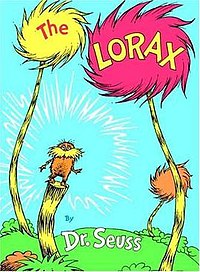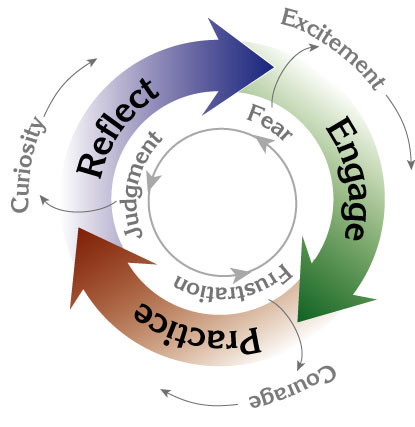Throughout the video, you were presented with animated 'evidence' that you can use to answer the following questions.
What has happened to the biodiversity over the course of the video?
How does supply and demand affect the economics of this story?
What is the environmental impact on air, water, and land in the video?
What is the balance between need and want in this story?
Does this illustrate the Tragedy of the Commons, NIMBY, or both?
Why is the Lorax so unsuccessful at convincing people to change their economics? Is there something that could have been done differently?
Can you think of examples in Iowa that illustrate this event happening?
This 'fable' has been praised as having an environmental wake-up call, as well as being a 'gloom-and-doom' scenario of environmental disaster. Give three points that support each side of the argument.
Wednesday, December 21, 2011
Wednesday, December 14, 2011
Personal Change Project
This world can benefit from some personal changes, and you are the one to tell us about it. This project will be done individually, and is due on the day your come back from break. It will be your goal to tell us, as a class, about a change that you believe benefits the world,and why you believe it matters. You must talk, include a digital artifact,and write a reflection after your presentation. This will take the place of a semester individual test.
Possible topics (yours must be approved individually by your teacher)
Possible topics (yours must be approved individually by your teacher)
- Bamboo as a building material
- LED vs. incandescent lighting
- European rail systems vs. US highways
- Needs vs. Wants in a Society
- Macromansions vs. Microhousing (400 sq ft or less)
- Microloans for Women
- Wind power in Iowa pros and cons
- Grow/plan your own garden
- Reducing a carbon footprint
- Seedsavers repository
- International Potato Center
- Off-the-grid lifestyles
- Meatless Mondays/Buy Fresh, Buy Local
- Farming with minimal chemicals
- Avoiding Banana Republics
- Childbearing in an Overpopulated World
- Eliminating Poverty Traps
- Should Wolves and Mountain Lions be brought back to Iowa?
- Carbon Sequestration
- Superinsulation
- Building Solar Houses in Iowa
- Oglalla Aquifer worries
- Extreme snowstorms: evidence of global warming?
- Homemade vs. store-purchased shampoos, soaps, and detergents
- How long should you keep a vehicle?
- Should you replace your water-guzzling household items?
- Recycled paper products: genuine change or consumer scam?
- Can vertical integration of livestock be sustainable?
- Adding swamps/marshes to our sewage systems
- Choosing new appliances
- Can regular maintenance of a car save fuel?
- Can I build in a sustainable manner?
Monday, December 12, 2011
Energy Comparisons
To find out about energy, you will need to gather the following artifacts:
http://www.getsolar.com/blog/active-solar-passive-solar/1554/
http://www.energysavers.gov/
http://www.pbs.org/wgbh/buildingbig/dam/basics.html
http://drake.marin.k12.ca.us/stuwork/rockwater/Upload%20this%20doc--dams%20and%20hydropower%20report/pros%20and%20cons.html
http://www.iowaenergy.org/
http://www.energy.iastate.edu/splash.html
http://www.public.iastate.edu/~lhodges/house.htm
http://www.getsolar.com/blog/active-solar-passive-solar/1554/
http://www.energysavers.gov/
http://www.pbs.org/wgbh/buildingbig/dam/basics.html
http://drake.marin.k12.ca.us/stuwork/rockwater/Upload%20this%20doc--dams%20and%20hydropower%20report/pros%20and%20cons.html
http://www.iowaenergy.org/
http://www.energy.iastate.edu/splash.html
http://www.public.iastate.edu/~lhodges/house.htm
a) a comparison of active solar vs. hydroelectric power
b) an explanation of the role of insulation in helping a passive solar system
c) three benefits of a passive solar system
d) an explanation of strip mining, open pit, and subsurface mining
e) a pro-con list of either geothermal, wind, or biomass energy
f) 5 ways to improve energy efficiency
g) your opinion on cars of the future
Thursday, December 8, 2011
Klamoth Basin Crisis

In this case study, students examine global water shortage problems in the context of the current Klamath Basin water crisis. Two main perspectives are addressed, agriculture and the environment, along with multiple other perspectives including Native Americans, hydroelectric dams, and the fishing industry. Students learn about and discuss competing interests for water and analyze and critique scientific data, maps, and graphs.
Important Note: Native Americans are considered sovereign citizens of BOTH their own tribe and the United States. So, negotiating with Native Americans means that they have the same rights and respect due to them (according to the Federal Code), as negotiating with a country like Great Britain or Saudi Arabia.
The Case to Consider
Power point overview
YOUR TASK Come up with a compromise that you feel deals with all the issues in a fair and equitable manner. Detail this viewpoint using Web 2.0 product and accompanying narrative, or a colored presentation with pertinent points. Your presentation must include a pie chart that divides the water available.
You must deal with:
- fresh water shortages
- the purpose of a wildlife refuge
- Native American rights
- fishing rights, including harvest, spawning, and various methods of capture
- hydroelectric dams and their purposes
- community needs
- agricultural irrigation needs
Grading will be done using the rubric below. Group size is a MAXIMUM of 2, individuals may work alone.
| 8-10 | 5-7 | 2-4 | 0-1 | |
| Explanation of Rationale | Makes most of the stakeholders happy | Makes half of the stakeholders happy | Makes one or two stakeholders happy | No one is happy |
| Quality of Presentation | Well organized and easy to read | Somewhat organized and easy to read | Easy to read | No organization, poorly done |
| Supporting Evidence | Each allocation has a firm rationale | Some of the allocations have a rationale | Rationales are mostly missing | Arbitrary |
| Tie-ins to World Water Resources | Delineates fresh/salt water concerns, considers aquifers, pollution, and the water cycle, considers factors like grey water, reuse of water, and sanitation, provides for animal and human needs(be sure to distinguish between needs and wants) | Delineates freshwater concerns, considers aquifers, pollution, and the water cycle, considers factors like reuse of water and sanitation, provides for animal and human needs(be sure to distinguish between needs and wants) | Delineates freshwater concerns, considers aquifers, pollution, and the water cycle, considers sanitation, provides for human needs(be sure to distinguish between needs and wants) | Does not tie-in World Water Resources |
Wednesday, December 7, 2011
Water Filtration System
Materials for Friday
Some of the materials you may need on Friday
Submit a sample to be compared against others in your classroom for color, pH, and microscopic composition.
Some of the materials you may need on Friday
- Empty 2 liter pop bottle
- Sand
- Gravel
- Screen
- Charcoal
- Fiberglass batting
- Cotton
- Filter papers
- Empty 8-20 ounce plastic bottle with lid
Submit a sample to be compared against others in your classroom for color, pH, and microscopic composition.
Tuesday, December 6, 2011
Water Purification Methods and Poverty Traps
Complete the Quick Topic

How does a desalination plant work?
Build your own chlorinator
Biosand Water Filters
Water Buffer Strips
Case Study Notes
Your goal: To create your own idea of what a poverty trap is.
To start, read http://www.theglobalist.com/storyid.aspx?StoryId=5032
In environmental science, we need to look at the world as a whole in terms of sustainability. If individuals matter, we need to look at natural capital, solutions, tradeoffs, degradation and still consider the fact that individuals matter.
How does water quality connect with the following image
To answer this question, we need to look at water treatment options
To start, read http://www.theglobalist.com/storyid.aspx?StoryId=5032
In environmental science, we need to look at the world as a whole in terms of sustainability. If individuals matter, we need to look at natural capital, solutions, tradeoffs, degradation and still consider the fact that individuals matter.
How does water quality connect with the following image
To answer this question, we need to look at water treatment options
How does a desalination plant work?
Build your own chlorinator
Biosand Water Filters
Water Buffer Strips
Case Study Notes
Friday, December 2, 2011
Assignment for Friday (Due Monday)
Go to the Sinkhole Case Study and take a look. You should be able to answer the questions posed (no, you don't have to write them down....today)
Subscribe to:
Comments (Atom)



